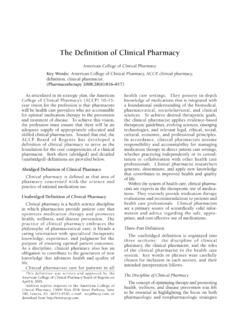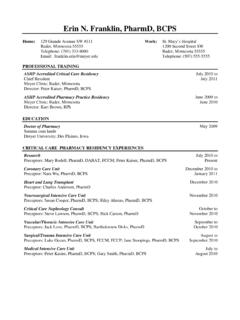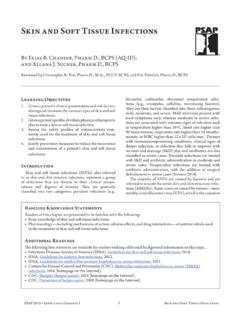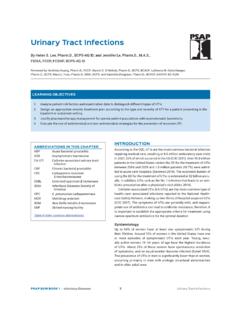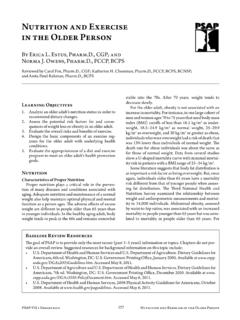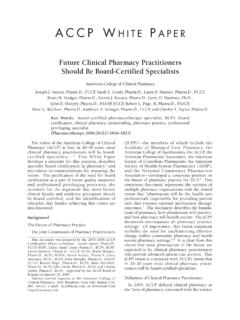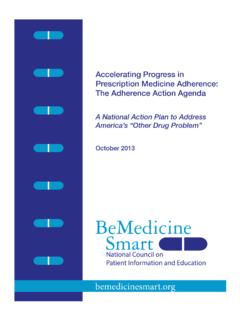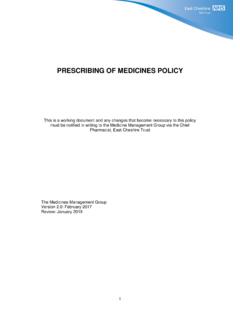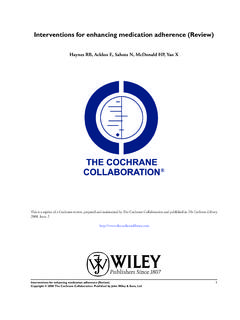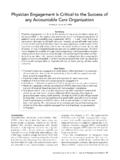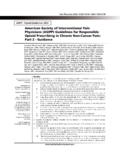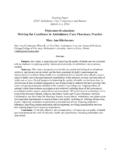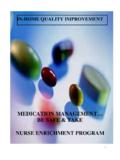Transcription of What is Medication Therapy Management (MTM) - …
1 what is Medication Therapy Management (MTM)? A range of services provided to individual patients to optimize therapeutic outcomes (help patients get the most benefit from their medications) and detect and prevent costly Medication problemsi. MTM provided by pharmacists, the Medication Therapy expert, results in: o A review of all medications prescribed by all prescribers providing care to the patient, and any over-the-counter and herbal products the patient may be taking to identify and address Medication problems. Problems may include medications not being used correctly, duplication of medications, unnecessary medications, and the need for Medication (s) for an untreated or inappropriately managed condition; o In-depth, Medication -related education, consultation, and advice provided to patients, family and/or caregivers to help assure proper use of medications; o Collaboration with the patient, physician, and other health care providers to develop and achieve optimal goals of Medication Therapy .
2 MTM as a part of the Medicare Part D Drug Benefit of PDPs and MA-PDs Medicare Part D Prescription Drug Plans (PDPs) and Medicare Advantage Plans (MA-PDs) must have MTM programs that provide appropriate services to targeted beneficiaries to optimize therapeutic outcomes. Under Part D, targeted beneficiaries are generally those: With multiple chronic conditions; Taking multiple covered Part D medications; and Likely to incur annual Medication costs that exceed a certain level (currently $4000). Part D plans have significant discretion in determining the number and types of chronic conditions and the number of Part D medications that will qualify their beneficiaries to receive MTM services.
3 As a result, there is considerable variation between Part D plans both with regard to who can receive MTM services and the type and comprehensiveness of MTM services that are provided. This variation, while understandable at the outset of the Part D program, is now resulting in some beneficiaries who could benefit from such services not qualifying for them within their plans. MTM is NOT Prescription Dispensing or Disease Management Prescription dispensing focuses on a Medication product, providing the right drug to the right patient with basic information on how to use the Medication . As part of the dispensing process, an offer to provide counseling or education on the specific product is made to the patient.
4 Disease Management activities focus on a specific disease in many aspects beyond Medication use. It provides the patient with education and tools to manage their disease(s) and includes interventions focused on medical treatments (health screenings and wellness services such as foot exams, eye exams, blood tests) and lifestyle modifications focused on improving the overall Management of the specific disease ( , diabetes Management , asthma Management , heart failure Management ). The focus on medications within disease Management programs is limited to those medications specifically used to treat the patient s disease rather than the patient s entire Medication regimen.
5 MTM focuses on ongoing Management of the patient s entire Medication regimen with a concentration on optimizing therapeutic effectiveness, preventing adverse events and achieving optimal Medication Therapy goals. Active involvement of patients is critical, empowering them to be a full participant in their own care through better understanding and use of their medications. MTM Empowers Patients MTM encourages patients to be active participants in their health care, empowering them to be more knowledgeable about and responsible for their health and Medication use.
6 MTM services facilitate a more effective partnership among patients, their pharmacists, physicians, and other health care providers to achieve optimum Medication Therapy results. Patients attest to the positive impact pharmacist-provided MTM makes in their care. Here s what some patients have to say about the benefits and the impact of MTM programs on their lives: Before, I felt like I was not in control. Now I set goals and focus on meeting them. Linda Goodwin, Credit Manager for the VF Corporation. I have a much more thorough understanding of my disease and how I can be actively involved in my treatment and ongoing Management .
7 I can now make decisions not just about diet, but about stressors, schedules, and activity levels. Karen Crockett, Early Childhood Specialist for Ohio State University This program has truly benefited our employees by giving them access to needed services that help them better manage their chronic disease and enjoy a better quality of life. We have also seen a significant financial benefit from this program in that per participant total health care costs fell from $11,600 in 2002 to $7,900 in 2005. Judy Pair, Corporate Director of Benefits and Diversity, Mohawk Industries, Calhoun, GA MTM Services Provide Value MTM services contribute to the safe, appropriate, and effective use of medications and offer value by: Improving the quality of patient care and outcomes ( , disease/symptom improvement/resolution, improved adherence, saved lives); Reducing health care expenditures ( , reduction in expenses associated with physician visits, urgent/emergency care visits and hospitalizations); Reducing Medication -related adverse events ( improved patient safety).
8 Evidence supporting the improved health care outcomes and better Management of health care expenditures that result from MTM services provided by pharmacists is abundant in both the public and private sector and includes: Iowa Medicaid Pharmaceutical Case Management (PCM) Program ii, iii an MTM program implemented in 2000 that targets high risk patients that take four or more medications has resulted in: Improved prescribing of appropriate medications A significant decrease in the use of high risk medications Wyoming PharmAssist Programiv an MTM program implemented in 2004 that provides any Wyoming citizen the opportunity to meet with a pharmacist for a Medication review to identify Medication Therapy problems and potentially reduce Medication costs has resulted in: An average yearly savings of $1,700 per patient The Asheville Project v a combined disease Management and MTM program designed for Asheville city employees resulted in.
9 A decrease in total direct medical costs ranging from $1,622 to $3,356 per patient per year 50 percent decrease in sick days An increase in productivity accounted for an estimated savings of $18,000 annually The Diabetes Ten City Challenge vi, an MTM health benefit offered by employer groups in ten communities has resulted in: Savings of approximately $918 per employee in total health care costs for the initial year 50 percent reduction in absenteeism The value of MTM in clinical, economic, and humanistic terms is real -- and the results are both remarkable and replicable.
10 While some of the programs demonstrating the effectiveness of pharmacist provided MTM services involve a more diverse range of patient ages, imagine the potential impact of pharmacist-provided MTM in a Medicare population that is often taking more medications and has more chronic conditions. Recognizing the Clinical Role of Pharmacists in Health Care A Medication that fails to produce the desired or expected therapeutic outcomes is clearly cost-ineffective, regardless of its price. The impact of inappropriate Medication use and Medication -related problems on patient morbidity and mortality has led leading policy makers in both the private and public sectors to provide recommendations on effective strategies to address this significant public health problem.
